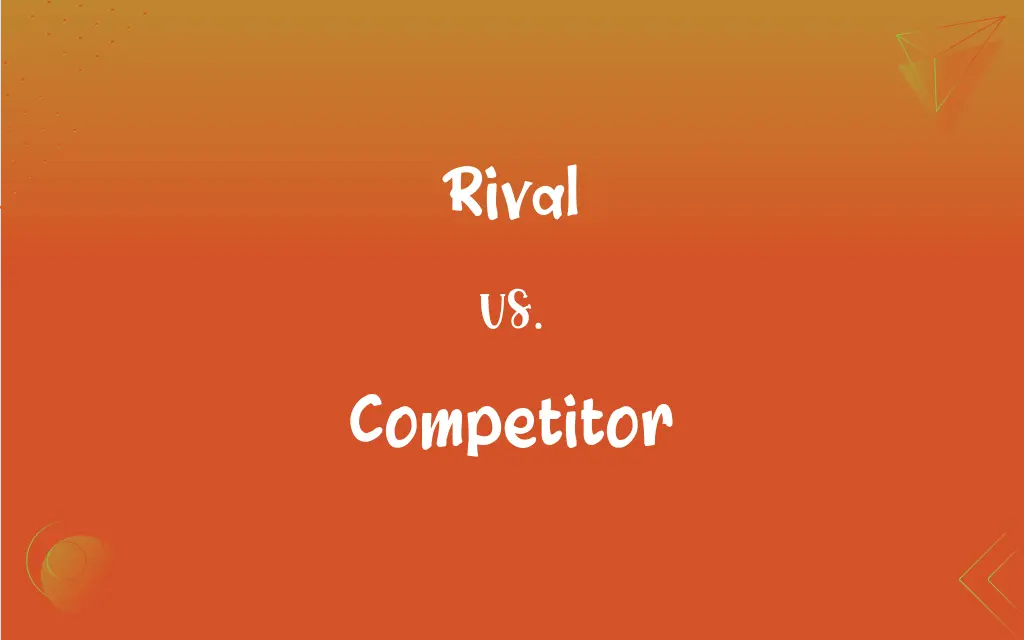Rival vs. Competitor: What's the Difference?
Edited by Harlon Moss || By Janet White || Published on December 12, 2023
A rival is someone who competes against another in a challenge, often with a sense of enmity, while a competitor is a participant in a competition without necessarily having a personal conflict.

Key Differences
A rival often implies a personal or intense competitive relationship, sometimes with negative connotations. A competitor, however, refers to anyone participating in the same field or activity, without personal animosity.
Rivalries are typically more intense and emotionally charged, often stemming from history or personal challenges. Competitors engage in competition primarily for the purpose of achieving goals, with less emotional involvement.
Rival is used in contexts where the competition is direct and often ongoing, such as in sports or business. Competitor is a broader term, used in various contexts like markets, sports, or academics, without the implication of a direct, ongoing challenge.
Rivalries can have historical or cultural significance, reflecting deeper conflicts or longstanding competitions. Competition among competitors is usually more immediate and based on current circumstances.
For rivals, surpassing or defeating the other party is often a primary goal. For competitors, the main goal is to succeed in their field, not necessarily to outperform a specific other party.
ADVERTISEMENT
Comparison Chart
Relationship Intensity
Often intense and personal.
Generally impersonal and professional.
Emotional Involvement
High, with potential for enmity.
Lower, focused on the competition itself.
Usage Context
Direct and ongoing challenges.
Broad range of competitive situations.
Historical Aspect
Can have historical or personal significance.
Usually based on current or specific events.
Primary Goal
Surpassing or defeating a specific opponent.
Achieving success in a field or event.
ADVERTISEMENT
Rival and Competitor Definitions
Rival
A person or entity competing against another, often with a sense of antagonism.
The two athletes became rivals after competing in several close races.
Competitor
A participant in a contest or competitive activity.
He respected his competitor, despite their rivalry on the field.
Rival
An adversary in a particular contest or field.
She regarded her classmate as her academic rival.
Competitor
An opponent in a business or market.
The new company emerged as a strong competitor in the industry.
Rival
A competitor with a long-standing or intense competition.
The two tennis players are known as historic rivals.
Competitor
A person or entity participating in a competition or contest.
Each competitor in the race trained hard for months.
Rival
Someone who seeks to equal or surpass another.
In business, he always saw the startup as his main rival.
Competitor
Someone who strives to win in a competitive environment.
As a competitor in the spelling bee, she studied every day.
Rival
An opponent in a rivalry, often with a personal edge.
Their political rivalry intensified as they became direct rivals.
Competitor
An entity vying for the same objective or resource.
In the bidding war, each competitor raised their offer.
Rival
One who attempts to equal or surpass another, or who pursues the same object as another; a competitor.
Competitor
One that competes with another, as in sports or business; a rival.
Rival
One that equals or almost equals another in a particular respect
She is his rival in sarcasm.
Competitor
A person or organization against whom one is competing.
Competitor
A participant in a competition, especially in athletics.
Competitor
(obsolete) Partner, associate, one working with another toward a common goal.
Competitor
One who seeks what another seeks, or claims what another claims; one who competes; a rival.
And can not brook competitors in love.
Competitor
An associate; a confederate.
Every hour more competitorsFlock to their aid, and still their power increaseth.
Competitor
The contestant you hope to defeat;
He had respect for his rivals
He wanted to know what the competition was doing
FAQs
What is the main difference between a rival and a competitor?
A rival implies a more personal and intense competition, while a competitor simply participates in the same field or event.
Can businesses have rivals and competitors?
Yes, businesses can have both rivals (direct and intense competitors) and general competitors in the market.
Are rivals always negative or hostile?
Not always; some rivalries can be friendly and respectful, though they are often intense.
Can rivalries be beneficial?
Yes, rivalries can motivate individuals or teams to improve and excel.
Can a competitor become a rival?
Yes, if the competition becomes more personal or intense over time.
Are rivalries more common in certain fields?
Rivalries are particularly common in sports, politics, and business.
Is it common for athletes to have rivals?
Yes, athletes often develop rivalries with others who challenge their abilities.
How do companies handle competition?
Companies strategize to outperform competitors in areas like pricing, quality, and marketing.
How do personal rivalries differ from professional ones?
Personal rivalries are based on individual relationships, while professional ones focus on competing in a specific field or market.
Is rivalry common in sports?
Yes, sports often see intense rivalries develop between teams or athletes.
Are rivalries always between individuals?
No, rivalries can also exist between teams, companies, or even countries.
Do competitors always want to defeat each other?
While competitors aim to win, their primary goal is success in their field, not necessarily defeating a specific opponent.
How do companies analyze their competitors?
Companies often conduct market research to understand competitors' strengths and weaknesses.
Do competitors collaborate?
Competitors can collaborate, especially when it's mutually beneficial, despite their competition.
Can a rivalry be one-sided?
Yes, sometimes one party may view the other as a rival without reciprocation.
How can a competitor stand out in a crowded field?
By excelling in areas like innovation, customer service, or efficiency.
Do rivalries affect consumer choices?
Yes, in business, brand rivalries can influence consumer loyalty and preferences.
Can rivalry lead to negative outcomes?
If taken too far, rivalries can lead to unethical behavior or excessive stress.
What creates a rivalry?
Rivalries often develop from competitive histories, personal conflicts, or close contests.
Can a friendly competition turn into a rivalry?
Yes, if the stakes increase or personal elements get involved, friendly competition can evolve into rivalry.
About Author
Written by
Janet WhiteJanet White has been an esteemed writer and blogger for Difference Wiki. Holding a Master's degree in Science and Medical Journalism from the prestigious Boston University, she has consistently demonstrated her expertise and passion for her field. When she's not immersed in her work, Janet relishes her time exercising, delving into a good book, and cherishing moments with friends and family.
Edited by
Harlon MossHarlon is a seasoned quality moderator and accomplished content writer for Difference Wiki. An alumnus of the prestigious University of California, he earned his degree in Computer Science. Leveraging his academic background, Harlon brings a meticulous and informed perspective to his work, ensuring content accuracy and excellence.







































































